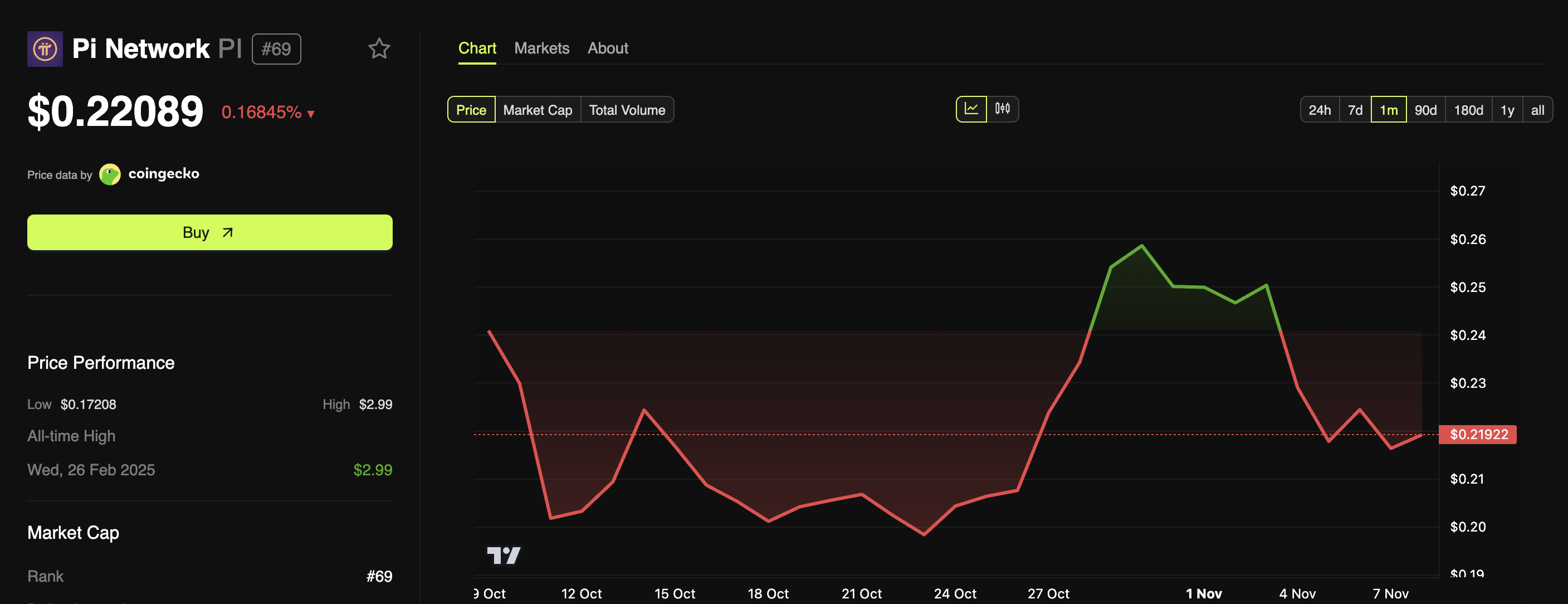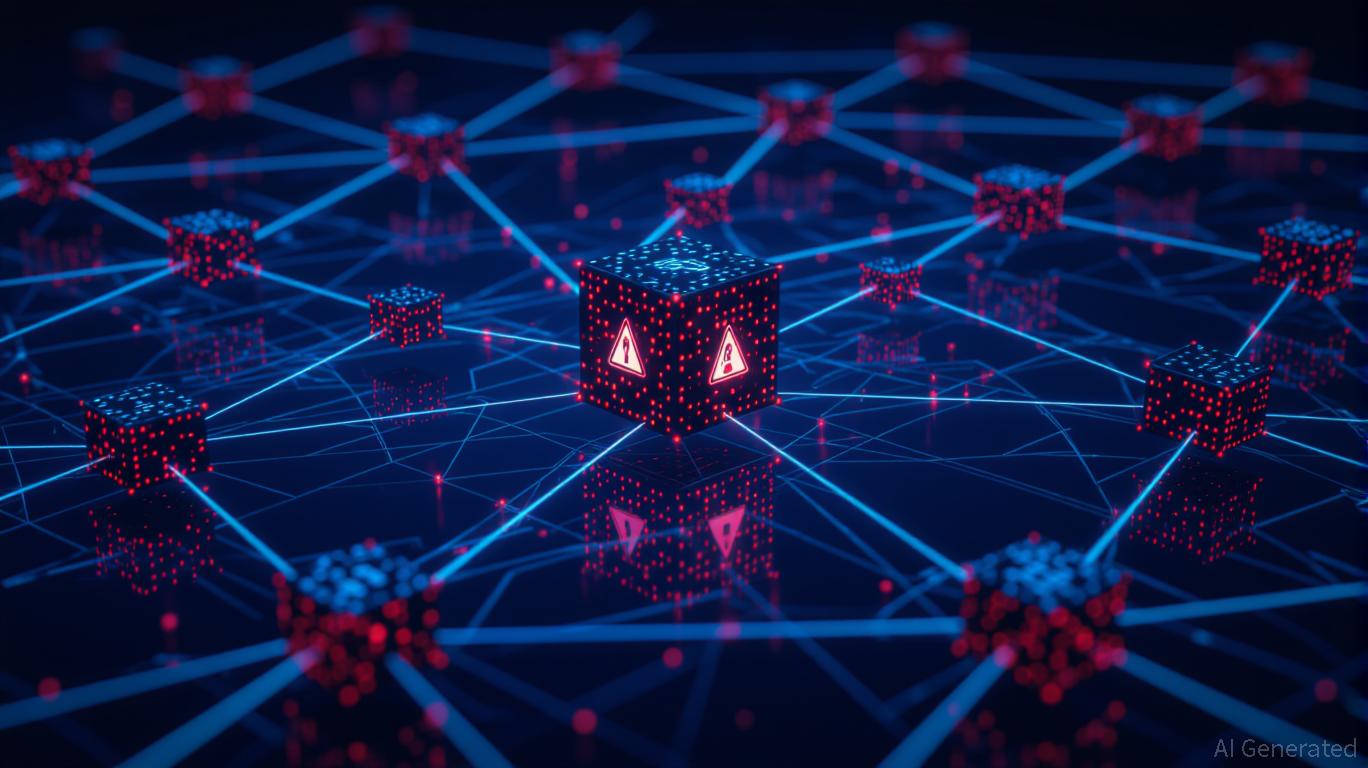Pi Network Rolls Out New Upgrade as Token Drops Another 10%
Pi Network’s new Pi Node update improves speed, rewards, and accessibility, yet low mainnet engagement and falling PI prices reveal deeper challenges facing the project’s growth and developer confidence.
The Pi Network has rolled out Pi Node version 0.5.4. The update introduces performance enhancements, refined reward calculations, and an improved user experience.
Despite these technical advances, the ecosystem is facing challenges. Mainnet activity remains low, and developer confidence is declining. Furthermore, Pi Coin’s price is also under pressure, having dropped nearly 10% over the past week.
Pi Network Introduces New Technical Enhancements
The Pi Core Team announced the release of Pi Node version 0.5.4 on November 6. The application was also renamed “Pi Desktop” to reflect broader functionality. Users can now access the Node, mining app, and Pi App Studio through a unified interface.
The update introduces several key enhancements, including fixes for community-reported issues related to Node mining rewards, automatic updates, and block container creation. It also introduces a new open port verification system to ensure accurate Node bonus calculations.
Furthermore, Pi Desktop now allows approved external links, letting users access blogs and resources directly from the mining app and Pi App Studio. These improvements collectively boost performance and the overall user experience for Pi Node operators.
“As announced in the recent update, Pi App Studio is now directly accessible from the top navigation bar in Pi Desktop, positioned alongside the Pi mining app and Node. An App Studio display issue where deployed apps were not displaying previews correctly has been resolved,” the team wrote.
This release builds on the OpenMind pilot project that demonstrated Pi Network’s capacity for decentralized AI training. OpenMind reported that more than 350,000 active nodes participated in the proof-of-concept, completing image recognition workloads.
Moreover, this partnership marked Pi Network Ventures’ first investment, signaling a shift toward real-world blockchain uses.
Pi Network Faces Pressure
However, this progress contrasts with the network’s current on-chain reality. Despite OpenMind’s large-scale participation, PiScan data shows only 296 active mainnet nodes and three validators at present.
Furthermore, developers have also expressed discontent with the network. This came after WorkforcePool, the first Pi Network Hackathon winner and a decentralized freelance marketplace, announced that it is up for sale. This drew criticism, with developers citing high operational costs, lack of team support, and slow progress.
The Pi Network launched its Open Network in February. This move was intended to improve accessibility and support dApp development. However, the speed of app development and mainnet migration has disappointed stakeholders, contributing to frustration among community members.
Lastly, the price performance has not helped Pi Network’s case. After the initial hype faded, Pi Coin has continued to show weakness. While PI rose briefly in late October, it slipped again shortly after.
 Pi Network Price Performance. Source:
Pi Network
Pi Network Price Performance. Source:
Pi Network
Pi Coin has declined by approximately 10% over the past week amid broader market pressure. At the time of writing, it traded at $0.22, down 0.168% over the past day.
Disclaimer: The content of this article solely reflects the author's opinion and does not represent the platform in any capacity. This article is not intended to serve as a reference for making investment decisions.
You may also like
Aster News Today: Optimism Faces Prudence: ASTER Approaches $1.21 Following RSI CEO's 16% Stake Sale
- Aster (ASTER) rose 8% toward $1.21 as Binance-backed DEX hit $3T in cumulative trading volume. - RSI CEO sold 16% stake ($11M+), raising doubts despite Q2 revenue growth (19.7%) and EPS beat. - ASTER faces mixed signals: bullish triangle pattern vs. declining fees, 50% open interest drop, and stagnant adoption. - Analysts remain divided: RSI's 22% YTD gain contrasts with ASTER's uncertain breakout potential amid waning trader enthusiasm.

The ChainOpera AI Token Crash: An Urgent Warning for Cryptocurrency Projects Powered by AI
- ChainOpera AI's COAI token collapsed 96% in late 2025, exposing systemic risks in AI-driven DeFi ecosystems. - Centralized governance (10 wallets controlled 87.9% supply) and misaligned incentives exacerbated panic selling during crises. - Technical flaws included untested AI models with 270% increased vulnerabilities and inadequate smart contract security audits. - Regulatory shifts like the GENIUS Act compounded liquidity challenges, highlighting the need for compliance-ready AI crypto projects. - Inve

How large a portion of the AI data center surge will rely on renewable energy sources?
Amazon satellite network receives a new name — and no longer emphasizes its low-cost promise
